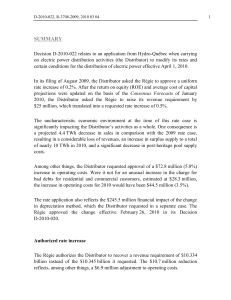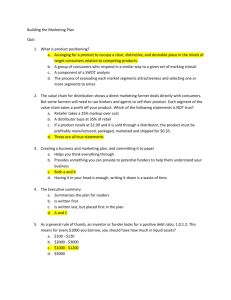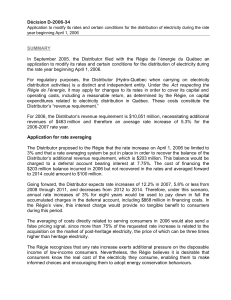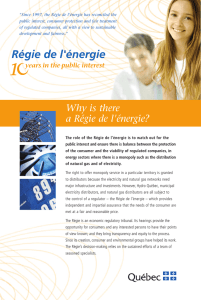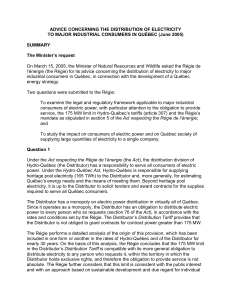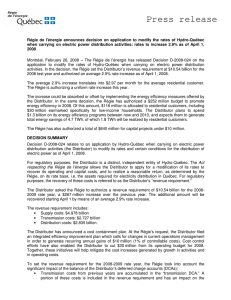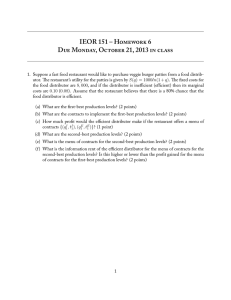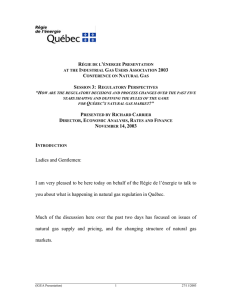EXECUTIVE SUMMARY
advertisement
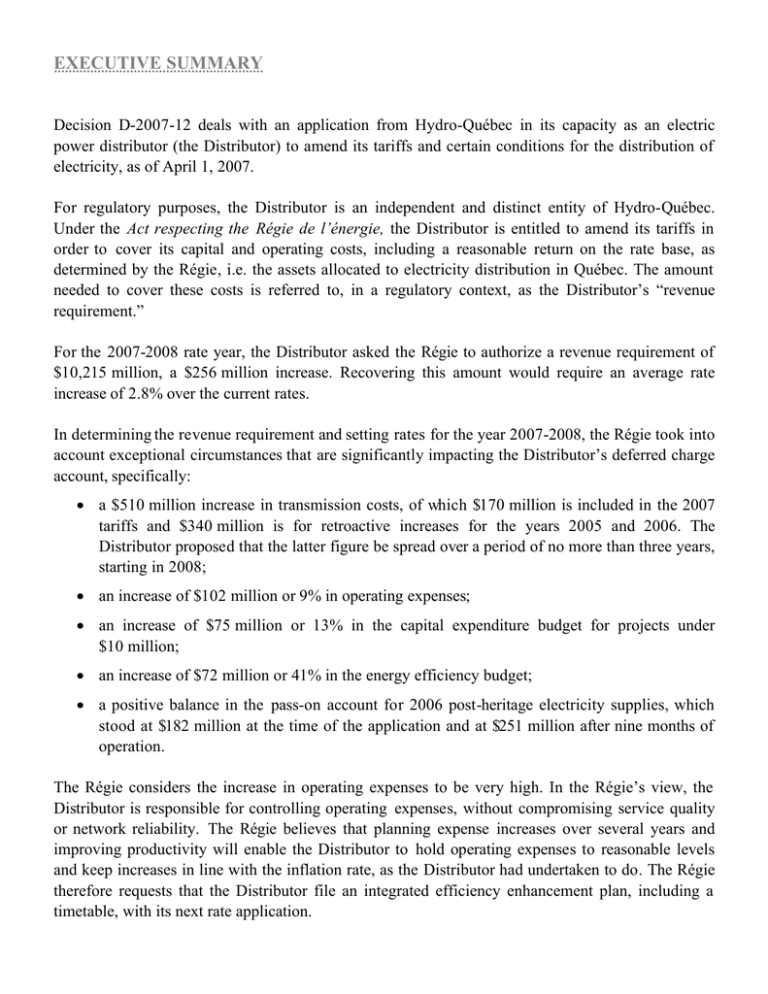
EXECUTIVE SUMMARY Decision D-2007-12 deals with an application from Hydro-Québec in its capacity as an electric power distributor (the Distributor) to amend its tariffs and certain conditions for the distribution of electricity, as of April 1, 2007. For regulatory purposes, the Distributor is an independent and distinct entity of Hydro-Québec. Under the Act respecting the Régie de l’énergie, the Distributor is entitled to amend its tariffs in order to cover its capital and operating costs, including a reasonable return on the rate base, as determined by the Régie, i.e. the assets allocated to electricity distribution in Québec. The amount needed to cover these costs is referred to, in a regulatory context, as the Distributor’s “revenue requirement.” For the 2007-2008 rate year, the Distributor asked the Régie to authorize a revenue requirement of $10,215 million, a $256 million increase. Recovering this amount would require an average rate increase of 2.8% over the current rates. In determining the revenue requirement and setting rates for the year 2007-2008, the Régie took into account exceptional circumstances that are significantly impacting the Distributor’s deferred charge account, specifically: • a $510 million increase in transmission costs, of which $170 million is included in the 2007 tariffs and $340 million is for retroactive increases for the years 2005 and 2006. The Distributor proposed that the latter figure be spread over a period of no more than three years, starting in 2008; • an increase of $102 million or 9% in operating expenses; • an increase of $75 million or 13% in the capital expenditure budget for projects under $10 million; • an increase of $72 million or 41% in the energy efficiency budget; • a positive balance in the pass-on account for 2006 post-heritage electricity supplies, which stood at $182 million at the time of the application and at $251 million after nine months of operation. The Régie considers the increase in operating expenses to be very high. In the Régie’s view, the Distributor is responsible for controlling operating expenses, without compromising service quality or network reliability. The Régie believes that planning expense increases over several years and improving productivity will enable the Distributor to hold operating expenses to reasonable levels and keep increases in line with the inflation rate, as the Distributor had undertaken to do. The Régie therefore requests that the Distributor file an integrated efficiency enhancement plan, including a timetable, with its next rate application. After analysing the expense line items and taking into account the fact that the Distributor could implement other efficiency measures, the Régie has decided to limit the increase in operating expenses to 6.5%. It has also decided to make other adjustments to the revenue requirement. In order to charge electricity supply and transmission costs to the generations of consumers for which the costs were incurred, the Régie has decided, contrary to its general practice, to depart from the amortization method for the deferred charge accounts in question. It is therefore directing the Distributor to reduce its revenue requirement by an additional $69 million in order to give consumers the benefit, as of 2007, of a portion of the credit related to electricity costs for 2006. The Régie is also directing the Distributor to include a $70 million amount in its revenue requirement, as of 2007, to cover a portion of the $340 million in retroactive transmission costs for 2005 and 2006. As well, in view of the postponement of the customer information computer project, the Régie is directing the Distributor to postpone inclusion in the revenue requirement of a portion of the related costs, namely an amount of $48.9 million. In all, the Régie has decided to reduce the revenue requirement by $146 million, which makes it possible to apply $70 million against the deferred charge account for transmission costs and a corresponding $23 million in financing costs, as of 2007. The Régie therefore authorizes the Distributor to recover through its tariffs a revenue requirement of $10,143 million in 2007 by increasing distribution rates by an average of 1.9%. The Régie estimates that the increase will come to $1.96 per month for an average residential customer, which amount could be absorbed or offset through the Distributor’s energy efficiency programs. Supply and service costs Electric power consumption in Québec now exceeds 165 TWh, which is the heritage electricity pool made available to the Distributor at an average cost of 2.79¢/kWh under the Act respecting the Régie de l’énergie. To meet the demand in 2007, the Distributor plans to purchase more than $664 million of post-heritage electricity at an average price of 8.1¢/kWh, or approximately three times the average cost of heritage electricity. In this regard, the Régie is directing the Distributor to change its cost allocation method for postheritage electricity supplies and use an hourly method that divides electricity supply costs among the different classes of consumers on an hour-by-hour basis. The purpose is to give the Distributor a more effective cost allocation tool that reflects the new supply environment. This tool could potentially be used to develop a time-differentiated pricing system, as contemplated in the Government of Québec’s energy strategy. The Régie is concerned with limiting anticipated rate variances in coming years, resulting from significant fluctuations in the supply costs included in the pass-on account. It understands that a substantial portion of this variance derives from weather conditions over which the Distributor has no control. The Régie therefore asks the Distributor to consider possible solutions to the issue of supply cost variance and its rate implications, and to file its proposed solutions in its next rate case. Rate of return The Régie sets the Distributor’s rate of return on the rate base at 7.79%. Pricing structures The Régie approves the tariff amendments proposed by the Distributor. The changes to the pricing structures will result in better price signals. The Régie is also issuing instructions with respect to points the Distributor should consider in studying a more extensive reform of pricing structures designed to better reflect long-term marginal costs. Comprehensive energy efficiency plan In view of consumer acceptance of the Distributor’s numerous energy efficiency programs, the 2007 budget for these programs will be a record $245 million. Of this amount, $106 million is allocated specifically to residential customers, including $19 million for low-income households. The allocation for low-income households has increased 41% year-over-year and is expected to generate energy savings of 25 GWh. The Régie approves the $245 million energy efficiency program budget for 2007, which is expected to yield energy savings of 2 TWh and thereby reduce the electricity costs of consumers who participate in the programs. The Distributor plans to spend a total of $1.3 billion on its energy efficiency programs between now and 2010. The programs are expected to generate energy savings of 4.7 TWh, including 1.8 TWh for residential clients. Capital expenditures The Régie authorizes a budget of $654.7 million for projects under $10 million, over and above previously authorized amounts. Capital expenditures total $729.7 million in 2007.
